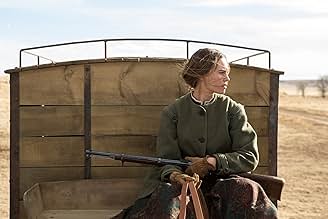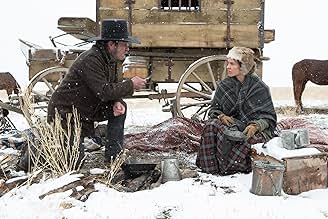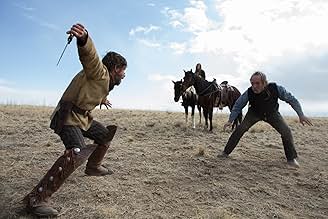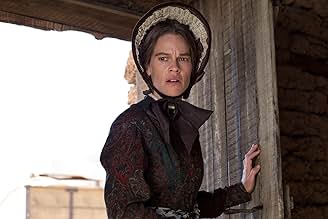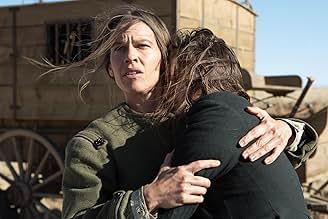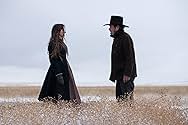Tre donne che sono state fatte impazzire dalla vita dei pionieri devono essere trasportate in tutto il paese da una donna pia e indipendente.Tre donne che sono state fatte impazzire dalla vita dei pionieri devono essere trasportate in tutto il paese da una donna pia e indipendente.Tre donne che sono state fatte impazzire dalla vita dei pionieri devono essere trasportate in tutto il paese da una donna pia e indipendente.
- Regia
- Sceneggiatura
- Star
- Premi
- 5 vittorie e 14 candidature totali
Recensioni in evidenza
The Homesman is a watchable film depicting the old west in a more true, and less glorious, fashion that most westerns. At first it is confusing, with flashbacks to explain the story, but later it becomes clear.
Prarie madness sets in and three women are slated to be returned Back East. The problem is that one of the three "responsible" men is unwilling to step up, so a woman volunteers. She is strong and courageous, more than most men, but isolated and desperate for a husband because she is "bossy, and plain as an old tin can."
Her ultimate fate is incongruous, completely at odds with her character. A willful suspension of disbelief is required at this point.
Solid performances by Swank, Jones, Lithgow, and the actress who played the madwomen make it entertaining, if a bit long.
Prarie madness sets in and three women are slated to be returned Back East. The problem is that one of the three "responsible" men is unwilling to step up, so a woman volunteers. She is strong and courageous, more than most men, but isolated and desperate for a husband because she is "bossy, and plain as an old tin can."
Her ultimate fate is incongruous, completely at odds with her character. A willful suspension of disbelief is required at this point.
Solid performances by Swank, Jones, Lithgow, and the actress who played the madwomen make it entertaining, if a bit long.
I really liked the western "The Homesman", but I strongly suspect that it won't be to everyone's taste. And I will admit that even this die hard fan of westerns didn't find it a perfect movie. The opening thirty minutes of the movie, for one thing, are somewhat confusing with some details, though eventually everything comes together and the audience knows what's been going on. And after that first thirty minutes, the movie continues to test the patience of viewers by being quite slow moving and long (the movie is over two hours long.) But I stuck with the movie despite all those things, and I feel I was rewarded in the end. The atmosphere of the movie feels extremely authentic, showing many of the hardships life in the wild west gave many people. Though the story is slow-moving, there are a number of interesting vignettes along the way. And you probably won't predict what eventually happens - the major plot turn around the two-thirds mark really took me by surprise. The last scene is a little unclear as to where one of the characters is headed, but it is memorable all the same. As I said, the movie is not for all tastes, but western fans who are in a patient mood will likely embrace it despite its flaws.
December 19, 2014
A homesman is someone tasked to bring people back to their homes. In this film, the people that needed safe transport are three mentally- disturbed women. Mary Bee McCuddy, a plain but hardy spinster, volunteered to be their homesman. Along the way, she rescues a old man Thomas Briggs from being hung by vigilantes and conscripts him to help her with her mission in exchange for saving his life. Together, they gather the three ladies and escort them from Nebraska homes across the dangerous Midwest prairie to a safe haven in Iowa.
Hilary Swank is an actress who had already won a couple of Oscars for playing strong women who had taken on masculine roles in life -- Brandon Teena in "Boys Don't Cry" and Maggie Fitzgerald in "Million Dollar Baby". As Mary Bee McCuddy, a pioneer lady who bravely accepts a task only men are expected to do, Swank again goes on the same award-baiting path. The movie worked so well when Swank was on screen. She was absolutely compelling in this offbeat role as if this was written with her in mind. The movie was not the same when her character was not there.
Tommy Lee Jones is one actor who, as of late, had seemingly been confined to playing curmudgeonly and cantankerous old men, and his Briggs here is not any different. This film is only Jones' second directorial effort since his critically-acclaimed debut in "Three Burials of Melquiades Estrada" back in 2005. As director, he was very generous to his lead female star Swank, and always gave way to let her shine. As actor, he does consistently as he is expected but this role of a grumpy old outlaw seems too familiar for him already. He wisely played Briggs with some self-deprecating humor to break the tendency of the story to become monotonously bleak.
There were some remarkable cameos from other award-winning or nominated stars in much smaller roles. John Lithgow is his usual capable self playing the Reverend Dowd who reluctantly sends McCuddy off on her task. Hailee Steinfeld plays 16-year old Tabitha Hutchinson to whom Briggs offers a surprising proposal. James Spader, in his usual over-the-top style, plays condescending hotel owner Aloysius Duffy. And last, but definitely not the least, none other than THE Meryl Streep plays perfectly kind and hospitable Altha Carter, who runs the institution in Iowa the women are headed for. These actors appear on screen for only ten minutes or so, but they leave a lasting impression.
The narrative may have been slow and desolate . However, the unusual situations, disturbing imagery, startling story developments and committed performances by the cast all keep our attention riveted. The cinematography with the muted colors worked well with the windswept landscape of its setting, as much a character in itself. The costumes and production design rang true to its mid-19th century time period. The haunting and unsettling musical score create an atmosphere of bitter emptiness. The insufferably miserable topic is clearly not for everyone. But for those who decide to give it a chance, the rewards will be satisfying. 7/10.
A homesman is someone tasked to bring people back to their homes. In this film, the people that needed safe transport are three mentally- disturbed women. Mary Bee McCuddy, a plain but hardy spinster, volunteered to be their homesman. Along the way, she rescues a old man Thomas Briggs from being hung by vigilantes and conscripts him to help her with her mission in exchange for saving his life. Together, they gather the three ladies and escort them from Nebraska homes across the dangerous Midwest prairie to a safe haven in Iowa.
Hilary Swank is an actress who had already won a couple of Oscars for playing strong women who had taken on masculine roles in life -- Brandon Teena in "Boys Don't Cry" and Maggie Fitzgerald in "Million Dollar Baby". As Mary Bee McCuddy, a pioneer lady who bravely accepts a task only men are expected to do, Swank again goes on the same award-baiting path. The movie worked so well when Swank was on screen. She was absolutely compelling in this offbeat role as if this was written with her in mind. The movie was not the same when her character was not there.
Tommy Lee Jones is one actor who, as of late, had seemingly been confined to playing curmudgeonly and cantankerous old men, and his Briggs here is not any different. This film is only Jones' second directorial effort since his critically-acclaimed debut in "Three Burials of Melquiades Estrada" back in 2005. As director, he was very generous to his lead female star Swank, and always gave way to let her shine. As actor, he does consistently as he is expected but this role of a grumpy old outlaw seems too familiar for him already. He wisely played Briggs with some self-deprecating humor to break the tendency of the story to become monotonously bleak.
There were some remarkable cameos from other award-winning or nominated stars in much smaller roles. John Lithgow is his usual capable self playing the Reverend Dowd who reluctantly sends McCuddy off on her task. Hailee Steinfeld plays 16-year old Tabitha Hutchinson to whom Briggs offers a surprising proposal. James Spader, in his usual over-the-top style, plays condescending hotel owner Aloysius Duffy. And last, but definitely not the least, none other than THE Meryl Streep plays perfectly kind and hospitable Altha Carter, who runs the institution in Iowa the women are headed for. These actors appear on screen for only ten minutes or so, but they leave a lasting impression.
The narrative may have been slow and desolate . However, the unusual situations, disturbing imagery, startling story developments and committed performances by the cast all keep our attention riveted. The cinematography with the muted colors worked well with the windswept landscape of its setting, as much a character in itself. The costumes and production design rang true to its mid-19th century time period. The haunting and unsettling musical score create an atmosphere of bitter emptiness. The insufferably miserable topic is clearly not for everyone. But for those who decide to give it a chance, the rewards will be satisfying. 7/10.
The Homesman, about a 31 year old (un-married/childless) woman (Hilary Swank) who takes up the challenge of bringing three crazed women across the Nebraska plains over five weeks with the help of a deserter-drifter left for dead (Jones), is in some ways meant to be a real Feminist Western (with a capital 'F'), and not in the way that a silly work like The Quick and the Dead was with Sharon Stone. Here, it's much more about depicting a time and place that was quite bleak and desolate and, in some spaces, without much hope. Ultimately Tommy Lee Jones, through the novel it's based on, sees a little more light at the end of the tunnel for his protagonist than, say, Eastwood did in Unforgiven. But it's a combination of things it's about, and emotionally the film does work quite well, in particular in the relationship that unfolds between the two leads.
If you're curious to see a western that has the love of the plains of the West visually speaking ala Ford, but has the dark contours of someone like Mann - and added to that those super dirty production designs and character realizations from Spaghetti Westerns - this might be it, at least up to a point. It's so unrelentingly dark in how it looks on at the deteriorating mental states of these women, and the desperation in the journey for Jones and Swanks' characters, that the few moments of humor are rather surprising - and welcome - especially when Jones first appears to Swank on the noose and the horse. It's the kind of scene that shows this actor, well into his 60's and pushing 70, trying something new in a performance (if only for a scene or two).
It's got a cast that is practically distracting for the who's who that shows up, mostly for one scene a piece: James Spader, Tim Blake Nelson, John Lithgow, William Fichtner, Meryl Streep (!) and Hailee Steinfeld (who appears almost to have wandered from the True Grit set to this one). There's so much going for the Homesman that it's a shame the script is uneven, and there's a plot twist two thirds of the way through that is sort of explained but not at all at the same time, and it leaves the film with a gaping tragedy that can never quite be filled. Interestingly, if you watch the behind the scenes on the blu-ray one of the screenwriters mentions the book left things unexplained as well. That might be fine in the book - or perhaps more was explained in other ways - but it still doesn't work, and what Jones goes for in awe-inspiring shots he leaves behind with some muddled story beats.
Nevertheless, The Homesman is a good Western, a solid western digging into the roots of the genre and mixing the unsavory and horrifying (not like a horror movie, just some repellant images at times, but for a point), though whether one will want to return to it like other, better Westerns is another story. It's the kind of picture I can't put down for its artistry, even if things can be looked at more critically, which may explain why it didn't find its way through the End-of-Awards-time (albeit it was accepted at Cannes).
If you're curious to see a western that has the love of the plains of the West visually speaking ala Ford, but has the dark contours of someone like Mann - and added to that those super dirty production designs and character realizations from Spaghetti Westerns - this might be it, at least up to a point. It's so unrelentingly dark in how it looks on at the deteriorating mental states of these women, and the desperation in the journey for Jones and Swanks' characters, that the few moments of humor are rather surprising - and welcome - especially when Jones first appears to Swank on the noose and the horse. It's the kind of scene that shows this actor, well into his 60's and pushing 70, trying something new in a performance (if only for a scene or two).
It's got a cast that is practically distracting for the who's who that shows up, mostly for one scene a piece: James Spader, Tim Blake Nelson, John Lithgow, William Fichtner, Meryl Streep (!) and Hailee Steinfeld (who appears almost to have wandered from the True Grit set to this one). There's so much going for the Homesman that it's a shame the script is uneven, and there's a plot twist two thirds of the way through that is sort of explained but not at all at the same time, and it leaves the film with a gaping tragedy that can never quite be filled. Interestingly, if you watch the behind the scenes on the blu-ray one of the screenwriters mentions the book left things unexplained as well. That might be fine in the book - or perhaps more was explained in other ways - but it still doesn't work, and what Jones goes for in awe-inspiring shots he leaves behind with some muddled story beats.
Nevertheless, The Homesman is a good Western, a solid western digging into the roots of the genre and mixing the unsavory and horrifying (not like a horror movie, just some repellant images at times, but for a point), though whether one will want to return to it like other, better Westerns is another story. It's the kind of picture I can't put down for its artistry, even if things can be looked at more critically, which may explain why it didn't find its way through the End-of-Awards-time (albeit it was accepted at Cannes).
Tommy Lee Jones has a wry, dry character -- rich and deep as unwatered open plains of the Americas. He's transferred his particular personality power to the story of The Homesman. He's successfully created a fine work of "auteur cinema" (much as I personally think this form rarely exists).
The Homesman is an emotionally and powerful, idea-rich, almost humorless story -- with an immense amount of humor. It has very tight, economic tale telling with no fat on the bone; in which much is implied, historical accuracy hits its target by nuance, and the story itself is deeply respectful of an intelligent audience.
The Homesman is not "entertainment" in the haha, shoot-'em-up Western sense. It's realism committed to a moral cause -- criticism of the disenfranchised, the homeless, the people who cannot make it no matter how hard they try. It has a brilliant sense of time and place that tells the life stories of dozens of hard-enduring, long-suffering "forgotten men" -- the women no less than the men.
The key heartbreaker is Hilary Swank's character of Miss Mary Bee Cuddy. She's born into a Western frontier world where she and everyone else believes and practices that "No man, having put his hand to the plough, and looking back, is fit for the kingdom of God." Hard workers and decent people. But tragically that is not enough. Why? The Homesman leaves that question deliciously unanswered. Life is not fair. God is not just.
Beautifully The Homesman does -- kind of -- answer life's problems with the value of sheer vitality and gutsiness itself. Thus that key visual motif in the movie that comes from: George Caleb Bingham, "The Jolly Flatboatmen". We must dance the dance of life, however mad.
The Homesman is an emotionally and powerful, idea-rich, almost humorless story -- with an immense amount of humor. It has very tight, economic tale telling with no fat on the bone; in which much is implied, historical accuracy hits its target by nuance, and the story itself is deeply respectful of an intelligent audience.
The Homesman is not "entertainment" in the haha, shoot-'em-up Western sense. It's realism committed to a moral cause -- criticism of the disenfranchised, the homeless, the people who cannot make it no matter how hard they try. It has a brilliant sense of time and place that tells the life stories of dozens of hard-enduring, long-suffering "forgotten men" -- the women no less than the men.
The key heartbreaker is Hilary Swank's character of Miss Mary Bee Cuddy. She's born into a Western frontier world where she and everyone else believes and practices that "No man, having put his hand to the plough, and looking back, is fit for the kingdom of God." Hard workers and decent people. But tragically that is not enough. Why? The Homesman leaves that question deliciously unanswered. Life is not fair. God is not just.
Beautifully The Homesman does -- kind of -- answer life's problems with the value of sheer vitality and gutsiness itself. Thus that key visual motif in the movie that comes from: George Caleb Bingham, "The Jolly Flatboatmen". We must dance the dance of life, however mad.
Lo sapevi?
- QuizGlendon Swarthout's novel was published in 1988. Paul Newman owned the rights, and wanted to direct the film himself. After several failed scripts, he gave up.
- BlooperDuring the Indian attack, every shot of the carriage has mountains in the background. The road from Nebraska to Iowa is nowhere near any mountains.
- Citazioni
George Briggs: Are you an angel?
Mary Bee Cuddy: You're not dead.
George Briggs: Help me. Will you help me? For God's sake.
- ConnessioniFeatured in Film '72: Episodio datato 19 novembre 2014 (2014)
- Colonne sonoreRosalie The Prairie Flower
Music & Lyrics by George Frederick Root (as George Fredrick Root)
Performed by Hilary Swank
I più visti
Accedi per valutare e creare un elenco di titoli salvati per ottenere consigli personalizzati
- How long is The Homesman?Powered by Alexa
Dettagli
Botteghino
- Budget
- 16.000.000 USD (previsto)
- Lordo Stati Uniti e Canada
- 2.429.989 USD
- Fine settimana di apertura Stati Uniti e Canada
- 45.433 USD
- 16 nov 2014
- Lordo in tutto il mondo
- 3.819.421 USD
- Tempo di esecuzione
- 2h 2min(122 min)
- Colore
- Mix di suoni
- Proporzioni
- 2.39 : 1
Contribuisci a questa pagina
Suggerisci una modifica o aggiungi i contenuti mancanti







